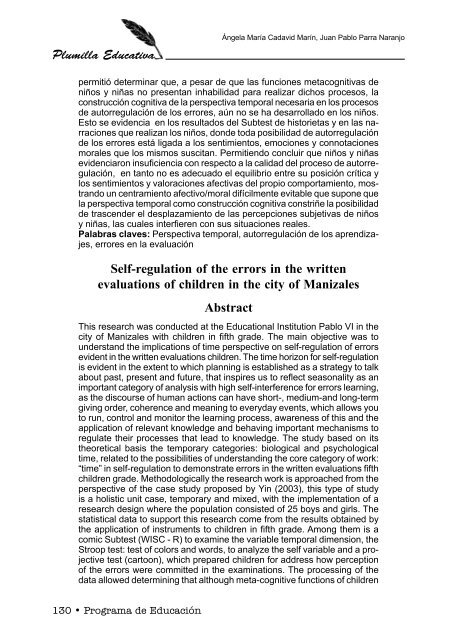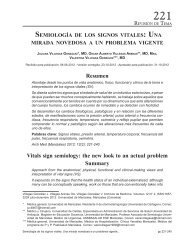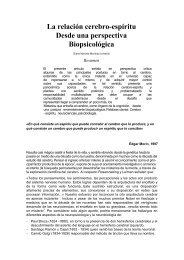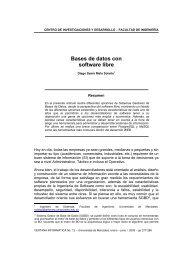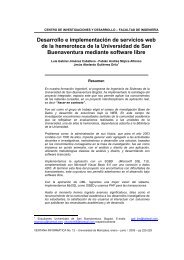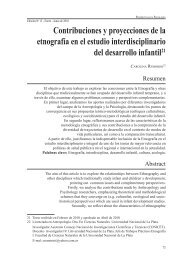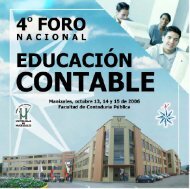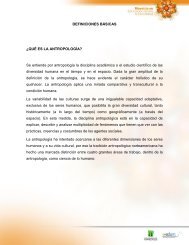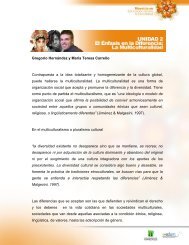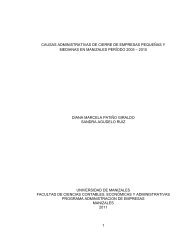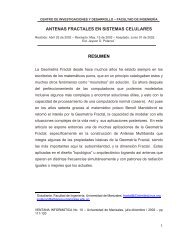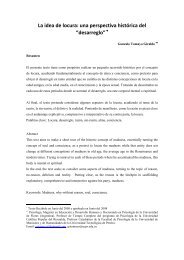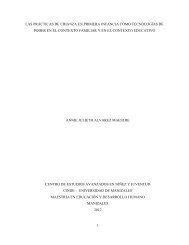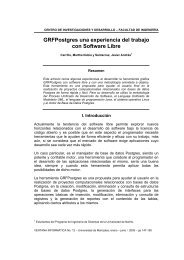Plumilla Educativa 7.pdf - Universidad de Manizales
Plumilla Educativa 7.pdf - Universidad de Manizales
Plumilla Educativa 7.pdf - Universidad de Manizales
- No tags were found...
You also want an ePaper? Increase the reach of your titles
YUMPU automatically turns print PDFs into web optimized ePapers that Google loves.
<strong>Plumilla</strong> <strong>Educativa</strong>Ángela María Cadavid Marín, Juan Pablo Parra Naranjopermitió <strong>de</strong>terminar que, a pesar <strong>de</strong> que las funciones metacognitivas <strong>de</strong>niños y niñas no presentan inhabilidad para realizar dichos procesos, laconstrucción cognitiva <strong>de</strong> la perspectiva temporal necesaria en los procesos<strong>de</strong> autorregulación <strong>de</strong> los errores, aún no se ha <strong>de</strong>sarrollado en los niños.Esto se evi<strong>de</strong>ncia en los resultados <strong>de</strong>l Subtest <strong>de</strong> historietas y en las narracionesque realizan los niños, don<strong>de</strong> toda posibilidad <strong>de</strong> autorregulación<strong>de</strong> los errores está ligada a los sentimientos, emociones y connotacionesmorales que los mismos suscitan. Permitiendo concluir que niños y niñasevi<strong>de</strong>nciaron insuficiencia con respecto a la calidad <strong>de</strong>l proceso <strong>de</strong> autorregulación,en tanto no es a<strong>de</strong>cuado el equilibrio entre su posición crítica ylos sentimientos y valoraciones afectivas <strong>de</strong>l propio comportamiento, mostrandoun centramiento afectivo/moral difícilmente evitable que supone quela perspectiva temporal como construcción cognitiva constriñe la posibilidad<strong>de</strong> trascen<strong>de</strong>r el <strong>de</strong>splazamiento <strong>de</strong> las percepciones subjetivas <strong>de</strong> niñosy niñas, las cuales interfieren con sus situaciones reales.Palabras claves: Perspectiva temporal, autorregulación <strong>de</strong> los aprendizajes,errores en la evaluaciónSelf-regulation of the errors in the writtenevaluations of children in the city of <strong>Manizales</strong>AbstractThis research was conducted at the Educational Institution Pablo VI in thecity of <strong>Manizales</strong> with children in fifth gra<strong>de</strong>. The main objective was toun<strong>de</strong>rstand the implications of time perspective on self-regulation of errorsevi<strong>de</strong>nt in the written evaluations children. The time horizon for self-regulationis evi<strong>de</strong>nt in the extent to which planning is established as a strategy to talkabout past, present and future, that inspires us to reflect seasonality as animportant category of analysis with high self-interference for errors learning,as the discourse of human actions can have short-, medium-and long-termgiving or<strong>de</strong>r, coherence and meaning to everyday events, which allows youto run, control and monitor the learning process, awareness of this and theapplication of relevant knowledge and behaving important mechanisms toregulate their processes that lead to knowledge. The study based on itstheoretical basis the temporary categories: biological and psychologicaltime, related to the possibilities of un<strong>de</strong>rstanding the core category of work:“time” in self-regulation to <strong>de</strong>monstrate errors in the written evaluations fifthchildren gra<strong>de</strong>. Methodologically the research work is approached from theperspective of the case study proposed by Yin (2003), this type of studyis a holistic unit case, temporary and mixed, with the implementation of aresearch <strong>de</strong>sign where the population consisted of 25 boys and girls. Thestatistical data to support this research come from the results obtained bythe application of instruments to children in fifth gra<strong>de</strong>. Among them is acomic Subtest (WISC - R) to examine the variable temporal dimension, theStroop test: test of colors and words, to analyze the self variable and a projectivetest (cartoon), which prepared children for address how perceptionof the errors were committed in the examinations. The processing of thedata allowed <strong>de</strong>termining that although meta-cognitive functions of children130 • Programa <strong>de</strong> Educación


